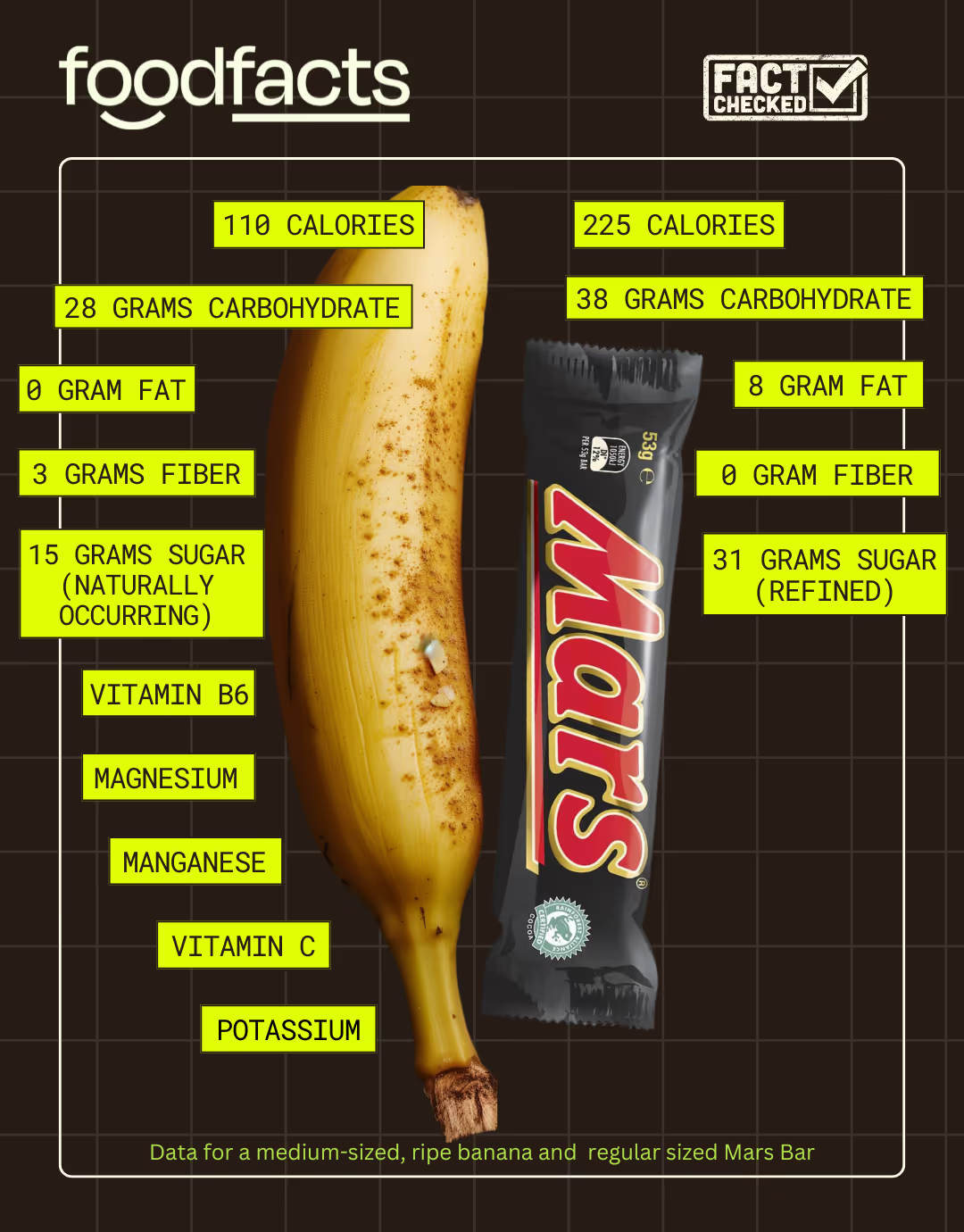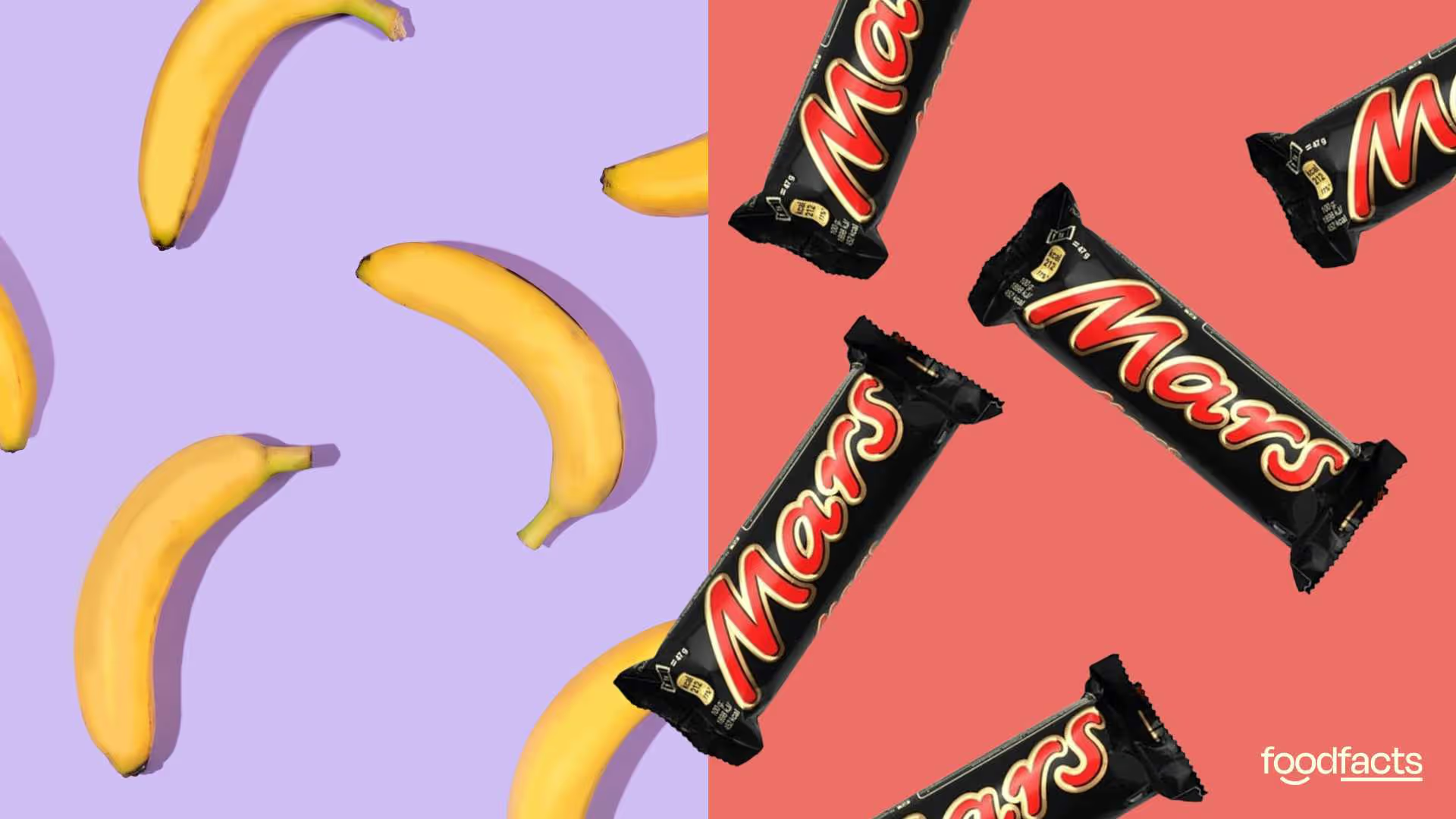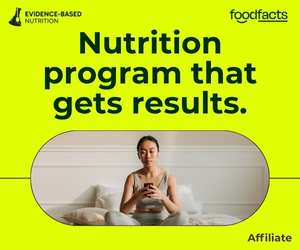
Bananas vs. Mars bars: an unnecessary comparison





Coral Red: Mostly False
Orange: Misleading
Yellow: Mostly True
Green: True
Learn more about our fact-checking policies
On February 26th, The Telegraph published an article asking the following question: what are the pros and cons of making bananas one of your five-a-day? The discussion was prompted by an intriguing comparison between bananas, a natural fruit, and Mars Bars, a processed chocolate bar. This review aims to examine the validity of this comparison and the nutritional claims made in the article, emphasising the importance of context in nutritional debates.
In this article, the misleading rating is driven by the impact of the headline. This is particularly important for publications such as The Telegraph which require a subscription to access the full article. In this case, the conclusions of the article do not reflect the headline’s sensational tone, or its implication that bananas are not as healthy as they seem. While the article itself is mostly factual, it does contain a number of misleading, sensational statements.
Sensational comparisons are a popular way to get readers' attention, but they do not yield comprehensive information. For example, by listing bananas' pros and cons, the article highlights their high potassium content. But you would need to eat eight bananas to reach the recommended amount of daily potassium. Excessive potassium intake should not be a concern when making bananas one of your 5-a-day. Challenging fear-mongering practices is an important step to counteract the effects of misinformation.

🚩“THE TRUTH ABOUT” this one food or product which you thought you could trust: does this sound familiar? The ‘truth’ is complex, nuanced, and crucially when it comes to health and nutrition, it tends to be context-dependent. This type of language can be a clue that a claim or post lacks nuance. Phrases like “health saviour” can be another clue. There is no single food or diet which can act as a guarantee of good health. Promoters of such products should be carefully scrutinized.
Let's dig deeper and take a close look at the different elements surrounding the Mars bar metaphor:
1) The headline
While we might think of metaphors as fanciful or fun uses of language, research shows that they can significantly impact reasoning. Talking about bananas as “Mars Bars in yellow skins” is a sure way to get a reader’s attention. But could it lead to further, noteworthy consequences? The metaphor highlights bananas’ sugar content, while overlooking their numerous health benefits and positive contribution to a balanced diet. Mars Bars, on the other hand, are predominantly made of sugar and fat, provide little nutritional value and are considered a treat rather than a diet staple. Although the article does detail bananas’ many benefits, drawing the comparison with Mars Bars is in itself misleading.
This study of bananas’ ‘pros and cons’ did not stem from observations or concerns from medical or nutrition experts: it was raised by an anonymous reader. While this does not mean that it has no validity, it could lead to unnecessary and unsubstantiated fears regarding the consumption of bananas, which tend to be an accessible, practical and popular fruit option, particularly among children.
2) The analysis: Banana’s pros and cons
Establishing a list of pros and cons can provide balance and nuance to a conversation. In this instance, the list provided by The Telegraph gives rise to an uneven comparison.
The ‘pros’ describe many of bananas’ properties and positive effects on overall health, and are aimed at the general population. On the other hand, the ‘cons’ mainly concern those with specific conditions, and for who the consumption of potassium should be regulated (bananas are widely recognized for their potassium content, which can help control blood pressure).
Besides sharing nutritional facts about bananas and advice about when to eat them (as their nutritional content changes as they ripen, affecting sugar and fibre levels), the article also makes some generalisations which allude to associations between the excessive consumption of bananas and weight gain, for example: “Too many will make you fat.” But this statement lacks context: unless you eat a copious amount, then consuming bananas will not lead to weight gain or obesity. In fact it could be the opposite, as several studies have found an association between fruit intake and weight loss due to their high fibre and water content (source).
3) The conclusions
The conclusions of the article closely align with common sense and general nutritional recommendations, in a stark contrast with the headline’s sensational tone. The bottom line is that it really is an “individual matter”. According to Penny Weston,“Like any other food, you have to listen to your body and how it responds. If you personally find that eating them seems to disagree with you, or your digestive system, look at other ways to get the nutritional benefits they do clearly have.”
This is an important reminder to go beyond headlines: zoom out and look at the full picture.

Our Final Analysis and Review
Fear-inducing headlines which compare natural fruits with sugary treats have the potential to create confusion, particularly for readers who might not go on to reach the article’s more balanced conclusions. The persuasive power of this metaphor lies in its potential to reinforce growing feelings of distrust when it comes to nutritional and health recommendations. The idea that even “the humble banana” might be disguised as a contributing factor to obesity directly appeals to general fears around food, and feelings of overwhelm which are exacerbated by some social influencers.
The comparison between bananas and Mars bars highlights a broader issue in nutritional information dissemination. While it's essential to be aware of what we consume, context matters. One tip that is often shared by nutrition experts when evaluating whether a food is ‘healthy’ or not is to ask the question: compared with what? Compared with other fruits, this conversation around bananas might have been slightly different. Compared with Mars bars, the picture is rather simple: bananas are the healthier choice.
Misleading ⭐️⭐️⭐️⭐️
Factual ⭐️⭐️⭐️
Balance ⭐️
Clarity ⭐️⭐
For more information on how this star-rating system works, you can check out our fact-checking policies here. It can be difficult to discern misleading information, especially when the content of an article appears to be mostly factual. The above star review highlights that balance is an important factor to take into account, besides the source of the information presented. In this case, the lack of balance leads the misleading rating.
Stand Against Nutrition Misinformation
Misinformation is a growing threat to our health and planet. At foodfacts.org, we're dedicated to exposing the truth behind misleading food narratives. But we can't do it without your support.
Sources
Public Health England, Government Dietary Recommendations
Healthline: healthline.com/nutrition/fruit-and-weight-loss
Sainsbury's: sainsburys.co.uk/gol-ui/product/mars-single-bar-58g
Harvard T.H. Chan School of Public Health: hsph.harvard.edu/nutritionsource/food-features/bananas/
Nutrients: ncbi.nlm.nih.gov/pmc/articles/PMC7231049/
European Journal of Nutrition: ncbi.nlm.nih.gov/pmc/articles/PMC10349712/
PLOS One: Thibodeau PH, & Boroditsky L (2011) Metaphors We Think With: The Role of Metaphor in Reasoning. https://doi.org/10.1371/journal.pone.0016782
PLOS Medicine: Bertoia ML, et al. (2022). Changes in Intake of Fruits and Vegetables and Weight Change in United States Men and Women Followed for Up to 24 Years: Analysis from Three Prospective Cohort Studies. doi: 10.1371/journal.pmed.1001878.
Nutrition Reviews: Rolls, B.J. et al. (2004). What Can Intervention Studies Tell Us about the Relationship between Fruit and Vegetable Consumption and Weight Management?



foodfacts.org is an independent non-profit fact-checking platform dedicated to exposing misinformation in the food industry. We provide transparent, science-based insights on nutrition, health, and environmental impacts, empowering consumers to make informed choices for a healthier society and planet.

Was this article helpful?
















.svg)
